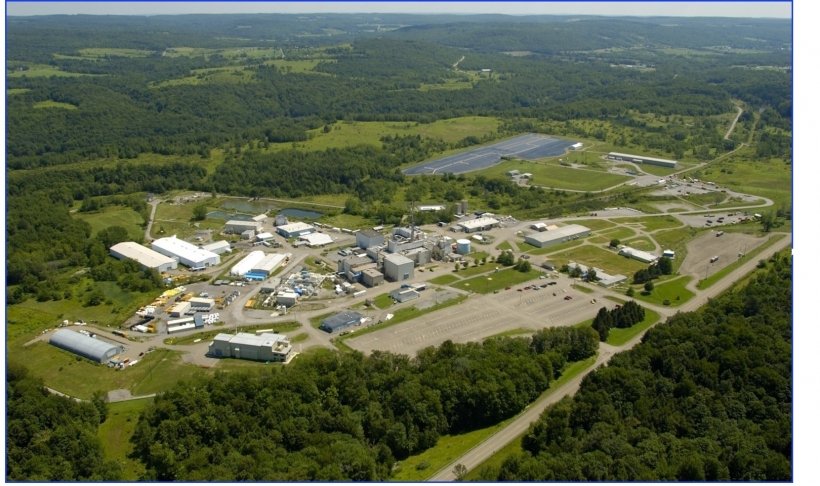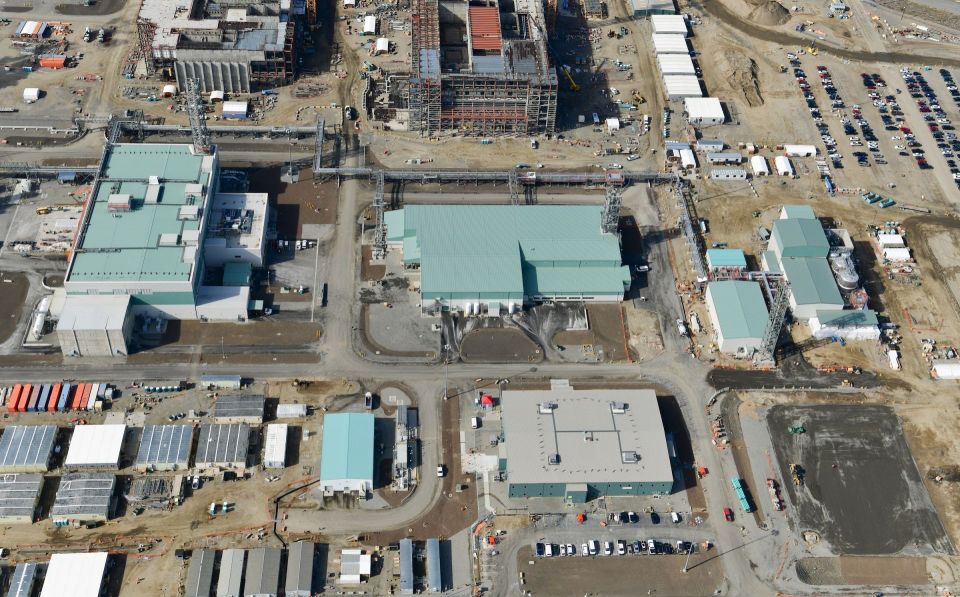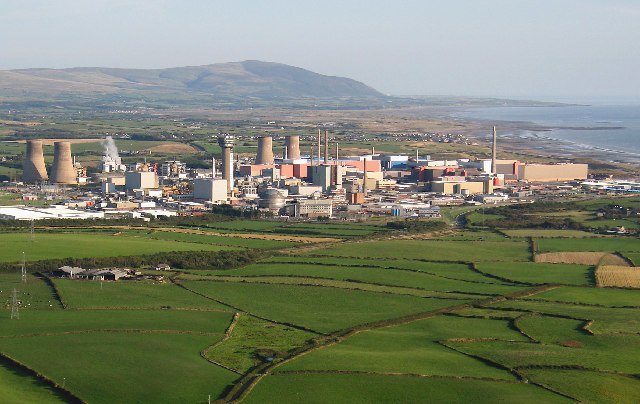Industry Update—April 2025
![]() Here is a recap of industry happenings from the recent past:
Here is a recap of industry happenings from the recent past:
ADVANCED REACTOR MARKETPLACE
Texas universities evaluating SMRs for water desalination
Natura Resources has signed a memorandum of understanding with two Texas universities—Texas Tech University and Abilene Christian University—to evaluate the integration of the company’s molten salt small modular reactor technology with water desalination systems. The collaboration includes Texas Tech’s Texas Produced Water Consortium, which was established by the Texas legislature in 2021 to explore the potential benefits of using treated produced water for purposes outside of the oil and gas industry of the Permian Basin. Produced water is salty or brackish hydrocarbon-containing water that is produced as a byproduct of oil and gas extraction. The stated goal of the new collaboration is to develop “a sustainable solution for water scarcity by purifying produced water from oil and gas operations, making it available for agricultural and other beneficial uses.” Abilene Christian University is planning to host the first deployment of Natura Resources’ Natura MSR-1, a 1-MWt molten salt research reactor.
Core Power has commissioned the naval architecture and marine engineering consultancy firm Glosten to develop the operational concept and design of a floating nuclear power plant (FNPP) for U.S. ports. Core Power’s FNPP concept involves a near-shore infrastructure system that includes a barge-based nuclear power plant, barge support services, electrical grid integration, and operational teams. This FNPP could provide about 175 gigawatt-hours of electricity per year, allowing ports to achieve zero-emission electricity generation for visiting ships, terminal cranes and equipment, and port vehicles. Glosten will also establish a regulatory path for the barge, navigate site location approvals, and identify a potential supply-chain network for the power plant’s fabrication, assembly, integration, transportation, and installation.
Type One Energy and the Tennessee Valley Authority have signed a cooperative agreement to jointly develop plans for a potential fusion power plant project called Infinity Two in the Tennessee Valley region. The plant would be based on Type One’s stellarator fusion power technology, which uses a figure-eight shape. The cooperative agreement expands on Project Infinity, which was launched in 2024 by Type One Energy, TVA, and Oak Ridge National Laboratory. That project envisions deployment of Type One’s Infinity One stellarator prototype at TVA’s Bull Run fossil plant in Clinton, Tenn., as well as general commercialization of fusion energy. Under the new agreement, TVA and Type One will collaborate on the Infinity Two fusion power plant siting studies, environmental reviews, and licensing and on the development of project plans and financing from various sources.
TerraPower has awarded vendor contracts to three additional suppliers to support its Natrium Reactor Demonstration Project, a sodium-cooled fast reactor facility under construction in Kemmerer, Wyo. James Fisher Technologies has been contracted to design and fabricate the sodium cover gas and test and fill facility filter skids. Mirion Technologies has been selected to supply the project’s radiation monitoring system and nuclear instrumentation system. Curtiss-Wright is to design and deliver the training simulator and supply the distributed control systems.
Advanced nuclear fuel developer Lightbridge Corporation has signed an MOU with Oklo, a developer of advanced nuclear power and fuel recycling technology. It calls for a joint feasibility study on the co-location of a Lightbridge commercial-scale fuel fabrication facility at the same site as an Oklo-proposed fuel fabrication facility, as well as for an exploration of potential collaboration in the recycling of nuclear waste. Oklo has been developing advanced fuel recycling technologies in collaboration with the Department of Energy and national laboratories, including Idaho National Laboratory, and has received a DOE site use permit. Lightbridge has been developing proprietary next-generation nuclear fuel technology for existing light water reactors and pressurized heavy water reactors and for new SMRs. Lightbridge previously signed two long-term framework agreements with Battelle Energy Alliance, the DOE’s operating contractor for INL.
GE Hitachi Nuclear Energy, the nuclear business of GE Vernova, has awarded a contract to BWX Technologies to manufacture the reactor pressure vessel (RPV) for GEH’s first BWRX-300 SMR, to be constructed at Ontario Power Generation’s Darlington New Nuclear Project site. The RPV is the largest component in the BWRX-300. BWXT has a previous contract from GEH to perform RPV-related engineering analysis, design support, and manufacturing and procurement preparations. Early site preparation work at the Darlington site has been completed, and construction of the first of four planned BWRX-300 units is expected to begin this year, pending regulatory approval. GEH hopes to launch commercial operations at Darlington by the end of 2029.
Additionally, GEH has signed new MOUs with British nuclear engineering firms Boccard and Cavendish Nuclear to accelerate the deployment of SMRs in the United Kingdom. The agreements reflect GEH’s intention of collaborating more closely with U.K.-based suppliers in order to better advance the development and operation of GEH’s BWRX-300 SMR. The MOU with Boccard allows GEH to use that firm’s digitalized nuclear manufacturing facility in North Wales, including its bespoke software BocTrack and its nuclear-experienced engineering and project management teams. The MOU with Cavendish Nuclear builds on an existing relationship that has supported the regulatory approval of the BWRX-300 through the government’s generic design assessment process. GEH has been navigating through Great British Nuclear’s SMR selection competition and had previously announced SMR-related collaborations with Aecon, AtkinsRéalis, Jacobs, and Laing O’Rourke.
French SMR developer Hexana has formed a strategic partnership with the Belgian engineering firm Tractebel aimed at supporting the development of Hexana’s sodium--cooled fast neutron reactor energy platform. Hexana has been working on developing a 400-MWt reactor and integrating it with a high-temperature storage device. The company’s proposed power plant would consist of two reactors supplying a heat storage device, with an adjoining conversion system allowing the reactors to produce electricity on demand. The electricity generation would compete with gas-fired power plants, while the heat would be supplied directly to nearby energy-intensive industrial facilities. According to the new partnership, Tractebel will define the conceptual designs for the civil engineering and utilities of the nuclear island buildings, as well as the nuclear handling systems for the maintenance of large components. The results of Tractebel’s studies are to be incorporated into the safety option file that Hexana will submit to France’s Nuclear Safety and Radiation Protection Authority for licensing purposes.
Sweden-based Blykalla and France-based Newcleo have agreed to jointly research and develop materials for their lead-cooled fast reactors. Blykalla is developing the Swedish Advanced Lead Reactor (SEALER) SMR, and Newcleo is developing the Small Modular Lead-cooled Fast Reactor (SM-LFR). The new partnership between the companies involves the exchange of materials, results, and associated data to assist both firms with their R&D programs. It is also expected to help optimize supply chains and cross-border knowledge exchange, in accordance with the goals of the European Union’s SMR Alliance.
The governments of France and India have signed a letter of intent to establish a partnership for the development of SMRs and other advanced modular reactors. The countries will cooperate on the Jaitapur nuclear power plant project, a six-unit facility in the state of Maharashtra, India, with an installed capacity of 9.6 GWe, making it the most powerful nuclear power plant in the world.
Also, an MOU was renewed between India’s Department of Atomic Energy and the Commissariat à l’Energie Atomique et aux Energies Alternatives of France that concerns cooperation between the Global Centre for Nuclear Energy Partnership in India and the Institute for Nuclear Science and Technology in France.
Kärnfull Next, an SMR developer in Sweden, has secured the land rights for its project to build a power plant based on SMRs in the municipality of Valdemarsvik, in southeastern Sweden. Kärnfull Next obtained the land rights after previously entering into an exclusive partnership agreement with landowner Latona Group for the exploration of a possible nuclear power facility at the site. Kärnfull Next intends for its SMR campus at Valdemarsvik initially to host between four and six small LWRs, with the addition of between 10 and 15 terawatt-hours of electricity generation per year.
Romania’s RoPower Nuclear has appointed Germany-based TÜV SÜD as the owner´s engineer for the NuScale Power VOYGR SMR project, which is scheduled to be constructed by the end of the decade at the site of a decommissioned coal power plant in Doices,ti, Romania. TÜV SÜD is to provide engineering support and ensure design acceptance and compliance with national and international nuclear standards, including performing such services as verification of major equipment technical specifications, implementation of American Society of Mechanical Engineers specifications and quality assurance/quality control programs, and oversight of supply chains.
Norsk Kjernekraft has signed a letter of intent with the Nordic consultancy company Norconsult to promote the development of nuclear power in Norway. Norsk Kjernekraft plans to build, own, and operate off-grid SMR power plants in Norway in collaboration with power-intensive industries. The company is following the International Atomic Energy Agency’s Milestones approach, focusing on creating value in the early phases of its SMR projects and investigating potential nuclear power sites with several municipalities. Norconsult is one of the Nordic region’s leading consulting engineering companies.
Kazatomprom, the national atomic energy company of Kazakhstan, has signed a memorandum of understanding and cooperation with the Jordan Uranium Mining Company. The memorandum calls for the joint evaluation of uranium exploration and mining projects in Jordan, focusing on the project’s potential for further development. The work is expected to refine the understanding of Jordanian geological characteristics and resource availability based on heap leaching mining technology. The government of Jordan hopes that the work will also open new opportunities for the country’s nuclear industry, including employment opportunities, infrastructure development, and engagement of local contractors. Officials in Kazakhstan, which is the world’s leading uranium producer, hope that the Jordanian market will lead to an expansion of the Kazakh nuclear sector’s global presence.
South Korea’s Doosan Enerbility has awarded a second contract to Sweden’s Alleima for approximately 200 kilometers of steam generator tubes for installation in NuScale Power’s VOYGR SMRs. Doosan Enerbility had awarded a similar contract to Alleima in June 2023; delivery of those tubes was scheduled for 2024. The VOYGR PWR—which is available in four-, six-, and 12-module configurations—uses Alleima’s steam generator tubing alloys. NuScale had placed its first upper reactor pressure vessel long-lead production order with Doosan Enerbility in March 2023 for the subsequently terminated Carbon Free Power Project. Those modules are to be transferred to another project. The first-of-its-kind NuScale SMR facility is now slated to be constructed in Doi-ces,ti, Romania.
Korea Hydro & Nuclear Power has launched the APR Owners Group (APROG) as the first international organization dedicated to the South Korean–designed advanced power reactor (APR) model. The APR-1400 is an advanced PWR, generating 1,400 MWe over a 60-year design life. It was principally designed by Korea Engineering Company. Members of the new group intend to share their expertise, with the objectives of continuously improving the safety and efficiency of APR reactors and strengthening the global recognition of the APR brand. Achieving the latter objective will include investments in joint R&D projects and development of innovative technological approaches to operations. Founding members of APROG include KHNP and Emirates Nuclear Energy Corporation. Associate members include South Korean firms KEPCO E&C, KEPCO KPS, KEPCO NF, and Doosan Enerbility.
BUSINESS DEVELOPMENTS
Park Nuclear acquires product line
Park Nuclear has announced the acquisition of the 53MC5000 Process Control Station intellectual property from MicroMod Automation. The 53MC5000 multiloop process controllers have been installed at CANDU, pressurized water reactor, and boiling water reactor facilities around the world. The system is used for real-time control, supervision, and process management. The acquisition transfers ownership of the product line—including its intellectual property, manufacturing rights, and support services—to Park Nuclear.
The U.S. nuclear business of AtkinsRéalis has formed StAR, a mentor-protégé joint venture with Strata-G that will specialize in strategic contracts with the Department of Energy, other federal government agencies, and commercial customers. The joint venture combines the global nuclear, engineering, and program management capabilities of AtkinsRéalis with the regional professional services expertise of Strata-G. StAR was created with a six-year mentor-protégé agreement through a Small Business Administration program designed to help small businesses compete for federally procured opportunities. Strata-G has been a subcontractor to the AtkinsRéalis subsidiary Isotek Systems for more than 20 years.
The Texas Nuclear Alliance continues to announce new founding members for its association, which is dedicated to the advancement of nuclear technology in Texas. The latest founding members include King & Spalding and X-energy.
King & Spalding is an international law firm that represents a wide range of clients in the United States, Europe, the Middle East, and Asia. The firm recently served as an advisor to another TNA member—Natura Resources—on the development of that company’s first-of-a-kind molten salt reactor (MSR-1), which is planned for deployment at Abilene Christian University.
X-energy is a leading developer of advanced nuclear technologies, including small modular reactors and TRISO particle fuel. The company hopes to deploy the first commercial SMR in Texas.
Canada-based uranium fuel provider Cameco Corporation has become a strategic partner of the Net Zero Nuclear global initiative, which advocates a tripling of nuclear energy capacity to achieve carbon neutrality by 2050. Cameco has been a supporter of this initiative since 2023. Net Zero Nuclear intends to play a major role in this November’s UN Climate Change Conference (COP30) in Brazil.
Nuclear Waste Services has identified areas of focus for detailed studies of suitability within three communities in the United Kingdom as part of the process of selecting a site for the permanent deep burial of nuclear waste. The three communities participating in the geological disposal facility (GDF) site selection process are Mid Copeland, South Copeland, and East Lincolnshire. The studies involve gathering such information as geological data and data relevant for environmental protection. The GDF comprises a network of underground vaults and tunnels to be built 200 to 1,000 meters underground or under the seabed to permanently dispose of higher-activity radioactive waste. The process of selecting the GDF site is expected to take 10 to 15 years.
The United Kingdom’s Sellafield Ltd. and Nuclear Transport Solutions (the latter being part of the U.K.’s Nuclear Decommissioning Authority) have announced that they are making preparations for another return of high-level waste, in the form of vitrified residue, to Germany. This is to be the second of three shipments of vitrified residue from the United Kingdom to Germany. Seven flasks are to be transported from Sellafield through a German port and to the Isar interim storage facility, located in southern Germany, during the first half of 2025. The first shipment, involving six flasks sent to Biblis, was successfully completed in 2020.
The U.K. NDA has stated that it intends to establish a Plutonium Ceramics Academic Hub with two universities—the University of Manchester and the University of Sheffield. David Peattie, CEO of the NDA Group, previously pledged to make a £5 million ($6.3 million) investment over a five-year period in postgraduate research at British universities, with the objective of aiding the NDA’s plutonium disposition strategy.
Niger’s Council of Ministers has adopted a draft decree that grants the Niger-based company Compagnie Minière de Recherche et d’Exploitation (COMIREX) a permit for the Moradi uranium mine, which is located in the rural commune of Dannet. This mine has been in the public domain since 2015. According to the mining agreement, COMIREX’s work at Moradi is expected to produce an average of 300 metric tons of elemental uranium over a period of five years. The work is also expected to create 94 jobs for young people in the country. The permit requires COMIREX to contribute financially toward the training of staff in Niger’s mines ministry and to comply with environmental protection safeguards and the principles of sustainable management.
CONTRACTS
Agreement signed for nuclear battery
Radioisotopes producer Nusano has signed a collaboration agreement with Atomiq, the nuclear battery technologies subsidiary of Kronos Advanced Technologies. The companies agreed to work together on three projects related to the development and advancement of nuclear diamond battery technologies and infrastructure. The projects are focused on radioisotope supply, manufacturing infrastructure, and battery technology. The companies stated that they plan to co-develop an alpha voltaic and diamond nuclear battery that is powered by the decay of alpha- and beta-emitting radioisotopes within the battery unit.
Centrus Energy Corporation has signed a 10-year contract to supply enriched uranium to Korea Hydro & Nuclear Power. The value of the contract, which followed the signing of a letter of intent between the two companies one year prior, was not disclosed. The contract was contingent upon Centrus securing sufficient public and private financing to build new low-enriched uranium production capacity in Piketon, Ohio. The agreement was the first contract for South Korea to purchase enriched uranium from an American company in more than 10 years. KHNP stated that the contract will enable the diversification of the company’s enriched uranium sources and enhance the stability of its fuel supply, as well as foster deeper collaboration between the South Korean and U.S. nuclear sectors.
Fluidstack, an artificial intelligence cloud provider headquartered in the United Kingdom, has signed a memorandum of understanding with the French government to construct a large AI supercomputer powered by advanced nuclear technology in France. The supercomputer will ultimately host about 500,000 next-generation AI chips and is scheduled to become operational in 2026. Phase 1 of the project is being supported by an initial investment of €10 billion ($10.9 billion). The facility will provide as much as 1 gigawatt of dedicated AI computing power, though it will be designed for scalable expansion beyond 1 GW by 2028.
Kazakhstan’s Kazatomprom has signed a contract with Switzerland’s Axpo Power (along with Kernkraftwerk Leibstadt) to supply natural uranium concentrates for the Beznau and Leibstadt nuclear power plants. The four reactors at these two facilities account for almost 30 percent of Switzerland’s energy generation.






